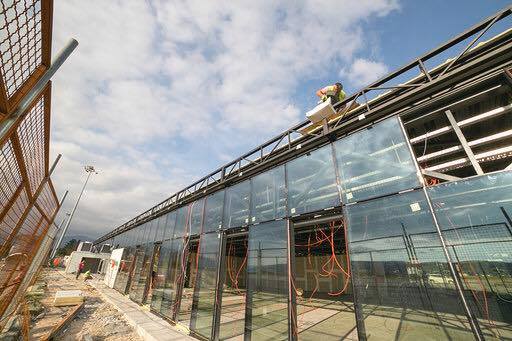Displaying items by tag: montenegro
20 December 2018 - The Cabinet within the Government of Montenegro passed the Decision on the Borrowings of Montenegro for 2019. This decision defines which loan arrangements will be concluded during 2019, with which financial institutions and in what amount, as well as which projects these funds are intended. The Decision also sets out for which loan arrangements the State can issue guarantees.
"The Decision also allows the possibility of the Government's borrowings to finance the budget amounting to EUR 370 million, of which EUR 190 million will be needed to finance budgetary needs, capital budget and debt repayment, while EUR 180 million are intended for funding the section of the Bar - Boljare motorway," General Director of the State Treasury Directorate Dragan Darmanović told a press conference following the Cabinet session, adding that the Decision stipulates that in 2019 the Government can also make loan arrangements for debt refinancing purposes in the amount of 250 million euros, a project to be provided through of the World Bank's guarantee. Also, there is a possibility of borrowings for the needs of implementation of the project of construction of the Smokovac - Mateševo section of the Bar-Boljare motorway.
Furthermore, the Decision provides for that during the year the State may borrow for the needs of the liquidity of the budget, and it is obliged to repay these funds by the end of the current year.
All these responsibilities are in line with the annual Budget Law for 2019, and the borrowings procedure will be implemented by the Government of Montenegro on the proposal of the Ministry of Finance.
During the very beginning of December, the Government of Montenegro presented Draft Budget for 2019.
"The Government of Montenegro does not envisage any additional measures of fiscal consolidation other than those established in 2017, but next year we will focus on improving tax environment, further economic growth and employment increase," Minister of Finance Darko Radunović said introducing the 2019 Draft Budget Law, which was adopted last night by the Government.
19 December 2018 - The NATO Council held its third session, chaired by the President of the Council, Prime Minister Duško Marković. The NATO Council reviewed several documents and noted that Montenegro, by its approach and quality and timely fulfillment of obligations within the Alliance, confirmed that it is a credible and reliable ally which is recognized by all NATO Member States.
In the context of the consideration of the implementation of Montenegro's Political Priorities in NATO in 2018, the Council noted that the successful profiling of Montenegro in the Alliance is important for the process of Montenegro's accession to the European Union.
The NATO Council considered the Report on the Annual Chairmanship of Montenegro by the US-Adriatic Charter (A5). It was concluded that through the organization of 17 meetings at the high and working level, Montenegro, in this way, proved to be a responsible ally that is ready to contribute to NATO policies, the stability of the region and promotion of Euro-Atlantic values in the Western Balkans.
The Report on the Implementation of the Action Plan for the Implementation of the Communication Strategy "Montenegro NATO member 2018-2020", as well as the 2019 Draft Action Plan, were reviewed and noted that Strategy is successfully implemented and that the activities envisaged for the next year corresponds entirely with the basic objectives of the document.
The NATO Council also considered the Report on the Implementation of the Action Plan for strengthening the national system of crisis response. It was pointed out the need for an improved normative framework with the aim of defining and positioning a particular national crisis management center.
Back in October, it was noted by the NATO representatives that NATO membership sends a clear message to the world that a member state is safe and is heading towards progress. As the NATO’s latest member state, Montenegro proves this as it has managed to double the foreign direct investments (FDI) after joining the Alliance.
19 December 2018 - At its 4th session, chaired by the President of the Council, Prime Minister Duško Marković, the Council for Competitiveness reviewed and adopted the Report on the Implementation of Montenegro Economic Reform Programme for 2018 and the Draft Montenegro Economic Reform Programme for 2019-2021.
Key Montenegro's documents in economic dialogue with the European Union and the key strategic documents for medium-term macroeconomic and fiscal programming read that in the past year, 19 of the 20 priority reform measures have been implemented in line with the foreseen deadlines and the planned budgets, and that Montenegro achieved excellent economic growth in the first two quarters. Available indicators for the third quarter show that the economic growth trend continues, last year's report states.
The document dealing with the past year lists the economic activities that resulted in excellent performance and the fact that due to the increased demand for labour and as a result of incentives for self-employment and the Government's active employment policy, the employment rate has significantly increased.
The Draft Montenegro Economic Reform Programme for the period 2019-2021 contains the agenda of structural reforms important for reducing or eliminating obstacles to economic growth and strengthening the overall competitiveness of the country and estimating economic growth for the following years: 2.8% in 2019 ; 2.3% in 2020 and 2.4% in 2021.
The discussion on these two agenda items pointed out that the conservative approach of the Ministry of Finance in the projection of economic growth includes all the risks and deficits in Montenegro's public finances, but that the Government's goal is far higher economic growth than projected as it was in the past two years. The Prime Minister stressed that he does not question the Ministry of Finance's projections that include all aspects and risks, but that the projected values of economic growth are not and cannot be the goal of the Government. "We are here to eliminate these risks and enable the continuation of high growth. This will be our agenda in 2019," Prime Minister Duško Marković said.
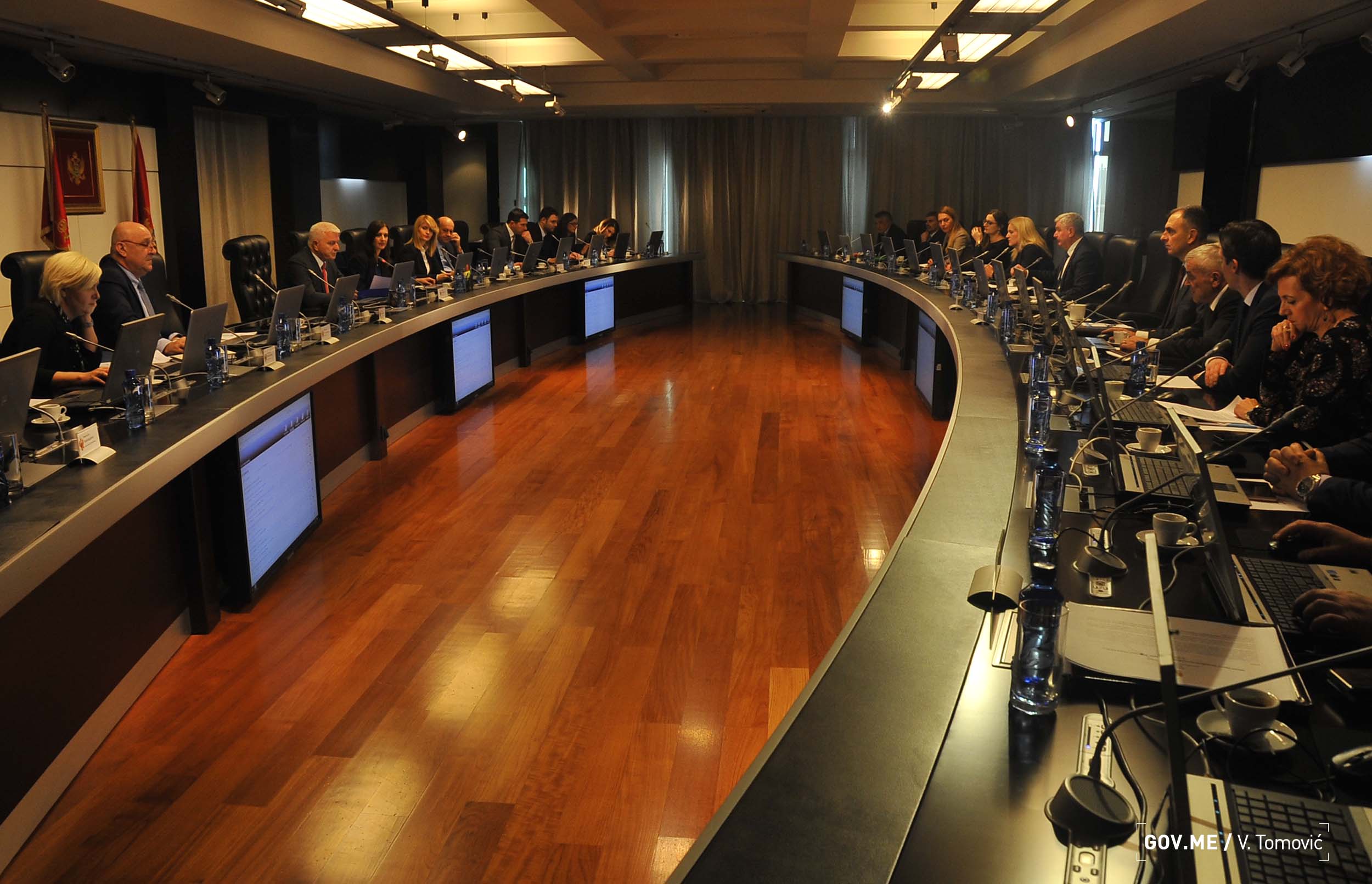
The Competitiveness Council reviewed the positioning of Montenegro in the World Bank's Doing Business Report for2 019, the Analysis of the fall in the ranking by indicators in the Doing Business Report 2019 and the Initiative of the Law Office Jovović, Mugoša and Vuković for amending legislation in the field of registration of economic entities and keeping public registers in the economy.
All ministries, the Real Estate Directorate, the Pension and Disability Insurance Fund, the Customs Administration, the Inspection Directorate and the Department of Public Revenues were tasked, and the Notary Chamber was recommended, to pay special attention to the implementation of the reforms previously recognised by the Action Plan for the improvement of business environment in 2019.
The Ministry of Finance was tasked, in cooperation with the Chamber of Commerce of Montenegro, to undertake activities to improve the reporting and data collection process for the Doing Business Report, through communication with contributors.
The Competitiveness Council reviewed the texts of the prepared laws on local communal taxes and administrative fees, as well as brief information on the status of the Law on Public-Private Partnership.
The discussion emphasised that both the Government and the economy share the approach that significant differences between Montenegrin municipalities in taxi policies discourage small and medium-sized businesses and that new revenues should not be based on taxes, but they must generate development and create new value.
The Ministry of Finance was tasked with undertaking further activities for the purpose of developing the law by the Government.
The Council was informed about the Report on parafiscalities at the local level - the municipalities of Budva, Bijelo Polje and Danilovgrad, created by the Union of Employers of Montenegro with the support of the International Labour Organisation.
The session reviewed the comments and suggestions made by the Union of Employers of Montenegro on the Draft Law on Fiscalisation in the sale of goods and services concerning the technical solutions of the online fiscalisation of bank accounts and cash transactions, as well as the keeping of tax registers, The Council recommended to the Ministry of Finance to consider the proposals in the process of developing the Draft Law.
The Competitiveness Council, considering the conclusions from the previous two sessions, noted that representatives of the economy were not included in the drafting of certain legal solutions. Ministries were tasked with drafting quarterly reports to the Competitiveness Council on the inclusion and consultation of business representatives in the development of laws that have an impact on the business environment.
19 December 2018 - Minister of Science Sanja Damjanović paid an official visit to Slovenia, where she met with newly elected Minister of Education, Science and Sports Jernej Pikalo for talks on the regional project of setting up the South-East Europe International Institute for Sustainable Technologies (SEEIIST).
Minister Damjanović stressed the significance of the SEEIIST project as one of the most prominent examples of "Science for Society" projects because of its medical application regarding using the most modern method in treating a wide range of cancer. She also highlighted its scientific dimension, pointing out that this project would be unique in the world precisely because 50% of the time would be devoted to biomedicine research. It is a development project that would enable the involvement of the economic sector, as the goal is to involve enterprises from the region in the construction of this modern technology, which would encourage technological transfer. As the project is now entering an active phase, active involvement of partners is needed, with Slovenia being one of the first countries to support the project. The first next step in this regard is the establishment of a joint body, which would apply for additional resources to finalise the "Design Study Phase."
Minister Pikalo agreed that such a project is needed for the region of Southeast Europe, but also for Europe in general, especially emphasising that within the Horizon Europe, the next EU Framework Program for Research and Innovation, within the second pillar "Collaborative Projects," "children's cancer" is on the list of missions' funding, so that the topic is currently in the context of the use of funds from this programme.
The two officials commended the excellent bilateral scientific and technological cooperation between the two ministries. They also voiced a willingness to reach an agreement on the future steps towards the SEEIIST project, which is of paramount importance for the implementation of the "Preparatory Phase."
During the mid-September, the SEEIIST Project was introduced in Montenegro. On this occasion, minister Damjanović concluded that the SEE region needs a major scientific research infrastructure that would trigger scientific excellence, prevent the outflow of talents, and stimulate innovation, mobility, internationalisation, and transfer of knowledge, as well as other complementary technologies. All of these necessities are methods of improving socio-economic conditions and enabling an attractive environment for young people, in which they want to work and create within their own country. This project, added Minister Damjanović, although fifth in Europe, will be unique in the world because it predicts that 50% of the project timeline will be spent on research, which will attract researchers from Western Europe.
19 December 2018 - Prime Minister Duško Marković and President of the Montenegrin Academy of Sciences and Arts Dragan K. Vukčević held an official meeting and noted that the history and culture of the country are the values that have been confirmed, and that development, civic harmony, and dialogue create the identity of contemporary Montenegro, which should be consolidated and promoted by all social stakeholders.
"Montenegro is not a state of nations but a state of citizens. In such a state, any kind of nationalism is dangerous and unacceptable. The basic question is whether we have the answers citizens expect from us or whether we will maintain the status quo and seek for patriots and enemies," said Prime Minister Duško Marković. He added that social dialogue is considered possible and desirable on every topic, except on the topic of the State of Montenegro. "The State is the only topic that cannot be the subject of any dialogue," Prime Minister Marković stressed.
President of the Montenegrin Academy of Sciences and Arts Vukčević noted that the goal of the synchronised action of all relevant segments of society should be Montenegro, which we aspire in the future.
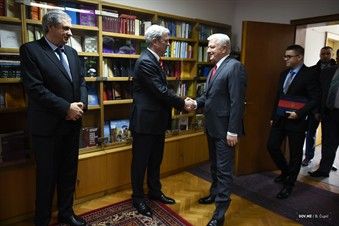
"Europe will recognise our values depending on the efforts we are willing to make to attain that goal," said Academician Vukčević.
Prime Minister Marković stated that insufficient development is the key deficits in both Montenegro and the region, and that is why the Government from the beginning of its mandate has insisted on development policies and projects, primarily in the northern region, as the least developed one.
"That is why I started projects to make the best use of our undeniable economic resources," said the Prime Minister, adding that such a policy has already been recognised and appreciated beyond the borders of Montenegro. Therefore, the Prime Minister continued, the overall development is a task not only for the Government but for all responsible social stakeholders. We will work together with the Academy to achieve the goals that are significant for the future of Montenegro," PM Marković concluded.
18 December 2018 - The first meeting of the newly formed Montenegrin Water Management Commission for Cooperation with Albania was held today in Podgorica. Deputy Prime Minister and Minister of Agriculture and Rural Development Milutin Simović attended the meeting.
The establishment of bilateral water management commissions is an obligation by the Framework Agreement on Water Management between Montenegro and Albania signed at the joint session of the governments of Montenegro and Albania, held on 3 July 2018 in Shkodër.
The Water Management Commission is a technical body that will work on the analysis and proposal of the best possible solutions for the improvement of cross-border management of surface and groundwater between Montenegro and Albania.
The primary goal is to preserve cross-border water resources, harmonise with EU standards, implement the Water Convention, and develop the best management model through dialogue based on arguments obtained through scientific and professional analysis of the current situation and future scenarios of planned development.
In the past period, cross-border projects have been prepared through the instruments of support of the Global EnvironmentFund (GEF), GIZ, the World Bank, the European Union, as well as national institutions – Montenegrin Academy of Sciences and Arts (CANU), Directorate for Waters and Hydrometeorological Institute.
The newly formed Montenegrin Water Management Commission will work together with colleagues from the Albanian Water Management Commission to analyze the results so far and to propose common solutions. As it was concluded today, the Montenegrin side will initiate a joint meeting of the two countries' commissions as soon as possible, to intensify work on resolving common issues of interest to the two countries.
The issues of significant importance for Montenegro, such as the functioning of the hydropower plant on Drim, the embankments on Bojana, the river Grnčar, as well as the ongoing issues on the potential construction of buildings on Cijevna in Albania, will be opened and discussed in order to establish mutual interest, preservation and sustainable use of water resources.
Today's session, in addition to the members of the Commission, was attended by State Secretary of the Ministry of Sustainable Development and Tourism Saša Radulović and Director General of the Directorate for Environment Ivana Vojinović.
The members of the Water Management Commission of Montenegro are Momčilo Blagojević, General Manager of the Directorate for Water Management at the Ministry of Agriculture and Rural Development - President of the Commission; Damir Gutić, Director of Directorate for Water Management; Mićko Radulović, Faculty of Civil Engineering; Goran Sekulić, Faculty of Civil Engineering; Mihailo Burić, Faculty of Philosophy; Radovan Đurović, Faculty of Civil Engineering; Darko Novaković, Institute of Hydrometeorology and Seismology; Miodrag Radunović, Head of Legal Department at the Ministry of Agriculture; Enis Đokaj from the Ministry of Agriculture, Secretary of the Commission.
18 December 2018 - The representatives of the United Kingdom and Montenegro have announced that the two countries have signed bilateral agreements that will allow uninterrupted air traffic after Brexit.
UK Transport Secretary Chris Grayling said the open skies deal would ensure the country remained a leading global aviation hub once it has left the European Union. "These agreements will ensure Britain continues to prosper as we leave the EU and I’m confident the UK will reach a mutually beneficial deal, while we continue to prepare for all eventualities," Grayling said in a statement.
The Government in London pointed out that the goal was to replace the current framework under EU regulations.
The United Kingdom has also reached agreements in this area with Kosovo, Albania, Georgia, Iceland, Israel, Morocco, Switzerland, and the United States, but deals with other countries from the former Yugoslavia have yet to be concluded.
The European Regions Airline Association (ERA) said December 4 that it had written to the European Commission, urging it to “reach a solution as soon as possible that will allow airlines to continue operating as they do today” after Brexit. The ERA warned of “disastrous consequences for the aviation industry” if the UK and EU are unable to finalize a withdrawal agreement ahead of the UK’s planned departure from the bloc.
Separately, the European Commission has confirmed that UK citizens will have to pay to secure pre-travel authorization to visit EU countries after Brexit. Whereas now UK passport-holders can travel freely within the EU, in a post-Brexit world they will have to pay for approval under the European Travel Information and Authorization System (ETIAS).
The UK is due to formally leave the European Union on March 30, 2019.
Source: Air Transport World Online
18 December 2018 - Euro-Unit Montenegro Company, in cooperation with its long-time partner Yamaha Music Europe, is organising the event “ MUSIC DAYS ” at the shopping mall Delta City in Podgorica.
From Monday to Friday – December 17 to 21, in the central part of the shopping centre, the organisers will present a wide range of electric pianos and electric drums of the most prestigious producer of musical equipment - Yamaha.
All interested visitors will have the opportunity to try playing these instruments on site, to get more information about products within the music industry and even gain additional discounts for purchasing the instruments through vouchers to be distributed on this occasion.
The organisers expect the event to be visited by professionals from the musical-instrument sector as well as local professional and amateur musicians. By attending the event, you can forge business contacts and strengthen the existing ones, build up knowledge in the musical instrument world and purchase musical equipment at affordable prices with discounts.
The organiser of this event, Euro-Unit Montenegro Company, is a part of the Euro-Unit Group, which is the leading company in the sales of musical instruments and professional audio equipment in this part of Europe. The company started operating in Montenegro in 2007 and is engaged in the sales and maintenance of professional audio equipment and musical instruments as well as renting instruments and equipment for concerts, conferences, and similar events. Euro-Unit’s area of expertise also includes designing, installing and maintaining sound systems for all types of business premises, public institutions, schools, cafes, clubs, as well as conference halls.
Yamaha Corporation is a Japanese multinational corporation and conglomerate with an extensive range of products and services, predominantly musical instruments. As a brand, Yamaha Music Europe is known for its high-quality products - pianos, digital musical instruments, wind instruments, string instruments, percussion instruments, educational musical instruments, and professional audio equipment.
The representatives of Euro-Unit and Yamaha kindly invite you to visit the event and share the love for music with them!
17 December 2018 - Prime Minister Marković stressed that the ambition of Montenegro is to open soon the remaining negotiating chapter, Chapter 8 - Competition, and that the country worked diligently and provided the internal readiness to close several chapters.
Prime Minister Marković and Commissar Hahn agreed that progress has been made in the area of the rule of law. PM Marković paid particular attention to the fight against corruption and organised crime, where, in his words, the country achieved a lot, and that even better results are expected to be made soon, especially in the areas of combating human trafficking and money laundering.
The meeting also discussed progress in the field of media. The emphasis was placed on the protection of journalists and media assets. It was noted that a set of media laws that should improve the media scene are being drafted.
PM Marković informed Commissioner Hahn about the political situation in Montenegro. The two officials also exchanged opinions on developments in the region.
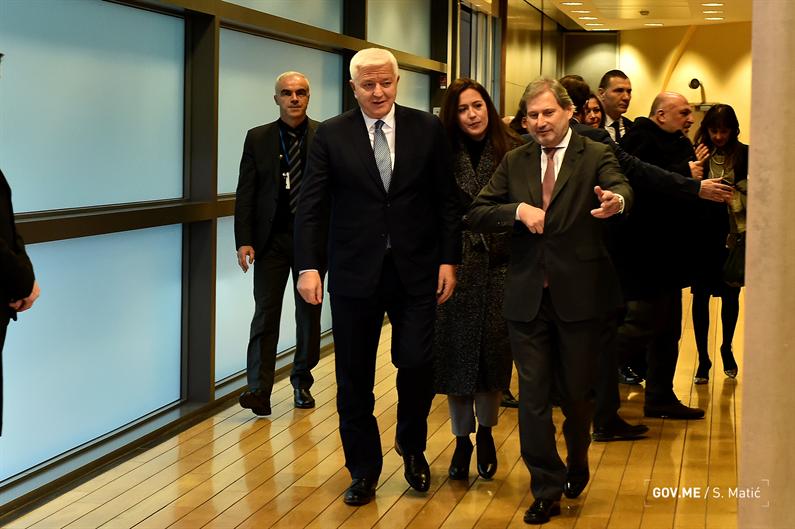
The Prime Minister said that Montenegro has been continuously promoting dialogue and stability and that it will continue to encourage the region's progress and its aspiration towards the European Union. Commissioner Hahn praised the role of Montenegro in the region.
Next year, PM Marković underscored, the Government will give priority to the achievement of dynamic development and complete financial stability in the country. He also pointed out the good economic results the Government has achieved, which is reflected primarily in economic growth, deficit reduction, and an increase in the number of employees.
During the summer, on the occasion of Joint Vienna Institute Lecture 2018, Johannes Hahn that the door of the European Union was undoubtedly open to the countries of the Western Balkans and pointed out that candidates must first of all be aware that without the rule of law there is no progress on the European path. He also stressed that freedom of the media and expression is a fundamental right in the EU, and he expressed particular concern about the political control of the media and the non-governmental sector in Montenegro.
On the occasion of Montenegro's opening of Chapter 27, Hahn said that Montenegro is making a significant step forward on its “European path”. He also welcomed the progress in the rule of law and said that the focus, in the coming period, should be placed on the activities under negotiating chapters 23 and 24. Commissioner Hahn reiterated that the European Commission would continue to support the integration of Montenegro into the EU in terms.
16 December 2018 - Tivat Airport’s new departure terminal with 1,300 square metres, that should provide more comfort for passengers, faster and better service as well as better working conditions for Airport employees, will be officially opened on Monday, December 24.
"One of our most significant projects in the last ten years is the construction of a new terminal of 1300 square metres, which will enable the service of twice as many passengers in the departure gates compared to our current capacity. Also, by constructing a new terminal, passengers will enjoy more convenience, we will prevent jams, and the work of our employees will be more efficient," executive director of the Airports of Montenegro Danilo Orlandić said in August this year, announcing the completion of works by the end of the year.
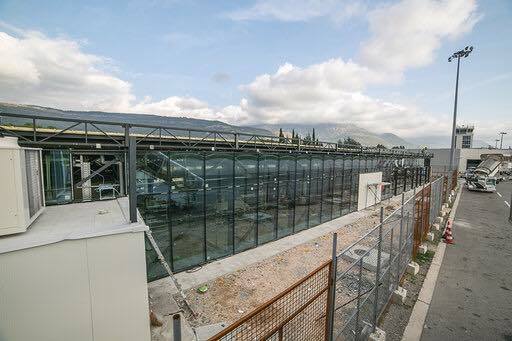
The new departure terminal will include six check-in counters, two new lines for security screening as well as offices for representatives of airline companies. Tivat Airport PR service also confirmed the construction of official premises for representatives of the Police Directorate and the Customs Administration, passenger toilets and a room for sorting luggage with all accompanying equipment.
The new facility of the departure terminal of the Tivat Airport was built in less than three months and was constructed by the Podgorica-based company “Fidija.” The value of the new facility with its equipment is about 2,2 million EUR. The new terminal was built on the northwest side of the current airport terminal building, and Airports of Montenegro entirely financed it.
